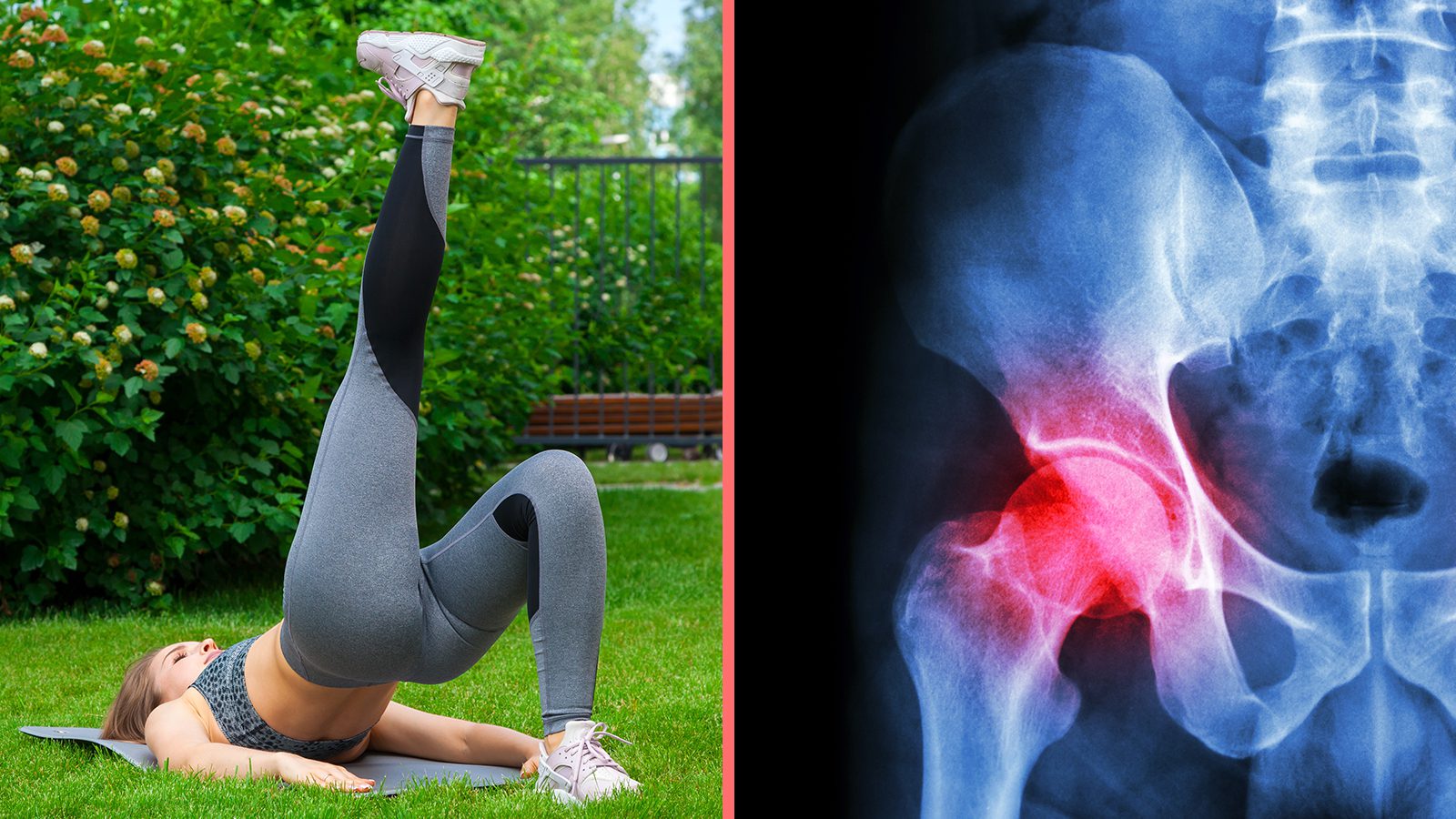Is bursitis cramping your style, or is the pain from your arthritis keeping you from doing the things you love? So many people live a sedentary lifestyle, and when you’re sitting at a desk all day, it has a dramatic impact on your muscles and joints. If you’re suffering from chronic hip pain, exercising the area to improve flexibility may be the answer.
Exercises for Hip Pain Will Also Improve Flexibility
Wouldn’t it be wonderful to be able to move pain-free? The key is to increase your flexibility and also decrease your inflammation. You can accomplish this by doing some simple exercises each day.
1. Butterfly Stretch
You want to move as graciously as a butterfly when you walk, so you need to enhance your flexibility. It might be a little painful to do this stretch if you’ve knee problems, but you can modify it based on your comfort level. Here’s how:
1. Begin by sitting on the ground.
2. This is like sitting Indian style, but you want to bend your legs and bring your feet together till the soles touch.
3. Allow your knees to fall gently towards the ground.
4. Slowly move your heels towards your body, and you must lean your body forwards into this stretch.
5. Place both elbows on your knees, and you need to press the knees further towards the ground.
2. Banded Walk
You will need exercise bands for this stretch. The banded walk is a fun and easy way to work those troubled areas and brings more flexibility. Here’s how:
1. Place the exercise bands around your ankles.
2. Bend your knees a bit and shuffle sideways. You should feel movement in your hips as you stretch them.
3. When you sidestep, you must keep your feet straight for proper impact. ‘
4. Step approximately ten or twelve steps to the left, then stop and go to the right.
3. Yoga Squat
The yoga squat will work on your knees and legs to help you gain flexibility. According to John Hopkins Medicine, over 23 percent of people in this country have knee problems. Your knees can cause radiating pain affecting your entire leg and your hips. So, doing some yoga squats may help increase flexibility. Here’s how:
1. Start by standing tall and keeping your feet about shoulder-width apart.
2. Gently bend your knees and bring your backside down as far as you can towards the ground.
3. Go into a prayer-type position by moving your arms in front of you.
4. Take a moment and breathe deeply, and you should use your elbows to put pressure on your thighs to move them apart.
4. Donkey Kick
The donkey kick is excellent at targeting that hip pain as it will strengthen this area. This exercise requires you to get down on all fours, so that it may be challenging with advanced mobility issues. Here’s how:
1. Get on the floor on all fours.
2. Make sure your right knee is slightly bent.
3. Gently raise your left foot upwards toward the ceiling.
4. The position of your foot should be flat, with the sole facing upwards while raising it.
5. If you’re doing this position right, you will fully engage your glutes while moving your foot.
6. When your foot is as high as you can get it, slowly tilt your pelvis to add more impact to this maneuver.
5. Lateral Squat to Reduce Hip Pain by Strengthening the Glutes
Doing this squat will help you target your butt area, which also affects hip pain. It can help you with your inner thighs too. If you want to sculpt and reduce inflammation, this exercise is for you. Here’s how:
1. Stand tall with your feet spread wide.
2. Keep your feet at 11 and 1 o’clock or facing forward. Just find what position is comfortable for you.
3. Transfer your weight to your left heel and push the hips backward.
4. Bend your left knee while striving to keep the leg straight. You’re doing it right if your thigh is parallel to the floor.
5. Move your arms in front of you to help you balance better.
6. Now, push your left foot through to reverse the movement to the other side.
7. When you’re at the peak of your squat, tighten your glutes and move your hips ahead.
8. Switch and do the other side.
6. Fire Hydrant
The fire hydrant is a fun exercise that pays tribute to man’s best friend. You should feel the burn in this one, but don’t worry; it will help with the inflammation and hip pain. Here’s how:
1. Start on the floor on all fours like a pup.
2. Make sure you keep your hands below the shoulder area, and your knees should be positioned below your hips.
3. With your right leg bent, gently raise it to the side. If done correctly, your thigh will be parallel to the ground.
4. Your core must stay engaged during this time, and your neck and back should be straight.
5. Slowly bring your back down to the traditional position on all fours and repeat on the left side.
7. Leg Raise
You can make this move with or without an exercise band. The band will provide additional resistance to work on that hip pain. However, your body weight can help if you don’t have any bands. Here’s how:
1. Begin by lying on the floor on your left side.
2. Your legs should be straight and on top of one another, and your elbow should be supporting your upper body.
3. If you want to add an exercise band to help with resistance, you must place it right above the knees.
4. Start with your right leg. Lift it as high as you can without discomfort. Make sure you engage your core as you lift.
5. Lower it back to the ground and lift it again. Strive to do ten lifts on the right side, then switch to the left.
8. Leg Swings
Leg swings are a good option for those who want to open up the hips and reduce some of that chronic hip pain. Remember, it hurts more at the beginning as you’re stretching areas you don’t typically work. Here’s how:
1. Stand tall and find a wall to brace yourself on.
2. Take a step backward from the wall till you’re about twelve inches from it.
3. Take your right leg and swing it from side to side. Try to think you’re a giant clock, and your leg is the pendulum.
4. Make sure you keep your torso area as straight as possible, which will be challenging with the swinging.
5. Place the right leg on the ground and switch to the left-hand side.
When your leg is swinging side to side, you should feel a stretching sensation in your hamstrings and your glutes.
9. Hip Flexors
Hip flexors will target the area that causes you the most discomfort. These stretches might irritate your hips at first, but once you work this area, you’ll feel relief. Here’s how:
1. Get down on the ground.
2. Put your right knee on the floor and bend your left leg so it’s in front of you at a 90-degree angle.
3. Now, place your left foot flat on the floor.
4. Place your hands on your hips and move your torso forward slowly. You should feel a stretching sensation in your hip flexor region.
5. When you feel tension, stop. Hold this pose for a minute. You want to stay here until the pressure releases as the muscles loosen.
6. Come back to the starting position and work on the other side.
10. Glute Bridge Reduces Hip Pain By Making You More Flexible
The final stretch is more advanced, so you shouldn’t attempt this if you have any doubts. You should feel a great stretch in the hip area, which can help with that inflammation and pain. Here’s how:
1. Lay on the ground with your back against the floor.
2. Keep your feet flat on the floor and your knees slightly bent.
3. Take your left leg and push yourself up from the floor. You should use your center core and butt muscles to do this step.
4. Use your arms and help yourself if you can’t do it with your core and butt muscles alone.
Final Thoughts on Exercises for Hip Pain–That Also Improve Flexibility
According to Consumer Safety, there are more than 450,000 hip replacement surgeries done each year in the United States. The number one cause of this surgery is arthritis. Preventative measures can help you avoid such an invasive operation, but it takes time and effort.
While you can’t erase wear and tear on joints and muscles, you can do something to combat the inflammation and hip pain by working the area. Try some herbal treatments like turmeric and magnesium to help alleviate discomfort too.



















